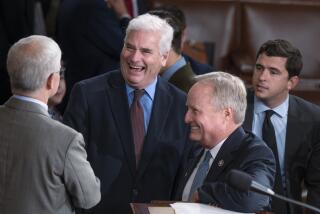As debt-limit pressure builds, Boehner finds himself in a lonely place
John Boehner, the top Republican on Capitol Hill, is in about as tough a spot as any conservative leader can find himself: praised by the Democratic president, mistrusted by many in the rank-and-file in his own party.
The House speaker, by President Obama’s own account, has been “sincere” in his efforts to secure a so-called “grand bargain,” a deal to raise the federal debt ceiling that would include about $4 trillion in deficit cuts, along with modifications to entitlement programs and the elimination of tax breaks that would yield more government revenue.
But the Ohio Republican, whether by his own choice or yielding to pressure building within his House caucus, pulled back from those talks over the weekend, saying that he favored instead a more limited deal focused mainly on reductions in spending.
Obama, in a news conference Monday, alluded to the hard-liners in Boehner’s House, many of whom don’t favor raising the nation’s debt limit at all. (One of them, presidential candidate Michele Bachmann, whose surging prospects have granted her a larger and larger megaphone, has been increasingly vocal about her opposition.)
“The politics in his caucus have been very difficult,” Obama said. In the nation’s electoral process, the president added, “Folks are rewarded for saying irresponsible things to win elections.”
Boehner has been in a fragile position ever since House Majority Leader Eric Cantor (R-Va.), who many in Washington view as a rival and potential successor to Boehner, pulled out of the deficit-reduction talks then being led by Vice President Joe Biden. Cantor drew the line on revenues, saying that no changes in the nation’s tax code could be used to eliminate deficits, but could only be utilized for tax relief in other areas.
Cantor, according to reports, did most of the talking in the Sunday negotiating session at the White House, a possible sign of Boehner stepping back from the fray.
Obama seemed to suggest Monday that House Republicans were not being serious about reducing the deficit. He said he had been warned by GOP leaders that reducing the debt was a “moral imperative,” and that failure to do so created “uncertainty” in the business climate.
“What I’ve said to them is: ‘Let’s go,’ ” the president said. He said it would still be possible to craft a broad package that would involve “both parties taking on their sacred cows.”
Rep. Paul Ryan (R-Wis.), chairman of the House Budget Committee, was criticized this year for releasing a sweeping budget that appeared to focus more on reducing tax rates and government revenue than eliminating the federal deficit. It would not have balanced the federal budget for at least 25 years.
At heart, Boehner is an old-school legislator and deal-maker. He has pointed with pride in the past for his work as a chairman of the House Education and Workforce Committee under President George W. Bush. Working with the late Sen. Edward Kennedy (D-Mass.) and others, Boehner helped forge the blueprint for massive bipartisan education reform — what became known as No Child Left Behind.
But the House has shifted dramatically to the right since that time, and it has never been clear that any vote to raise the debt limit would find widespread support within its GOP caucus. The chances of finding Republican votes diminished even more when talk of an Obama-led “grand bargain” surfaced late last week.
While House Republicans have drawn the line on taxes, and many are uncomfortable with any vote to raise the debt ceiling, there is also precious little appetite to sign off on any sweeping deal the president could use to his political benefit.
Seeking to mollify his rebellious charges, Boehner, for his own part, Monday reiterated his opposition to Obama’s approach.
“This isn’t just about loopholes. This is about raising taxes in the middle of a recession, and to tax the very people that we need to invest in our economy and grow jobs,” Boehner said on Laura Ingraham’s radio show. “I have been consistent about this, but the president just continues to believe that the rich aren’t paying their fair share. And his description of the rich is any couple that makes more than $250,000 a year. In the Midwest, that might be a reasonable number. But if you’re a firefighter or teacher in New York City, than all the sudden you’re rich. If you’ve got some two-bit part in a B-movie in Hollywood, all the sudden you’re rich.”
Over the weekend, Boehner said, “I made it clear to the president, there are no votes in the Congress to raise taxes. Let’s just forget it. He just won’t do it.”
The president, however, seemed to take Boehner’s current position in stride, telling reporters that he still hoped for a large-scale deal, and that he still believed Boehner could navigate the stormy seas in his own chamber. Obama said he was “vested” in the speaker’s capacity to do just that.
Boehner, Obama said, “is a good man who wants to do right by his country.”
High praise, for sure. But it may not be the kind of endorsement Boehner’s caucus wants to hear.
james.oliphant@latimes.com.
Michael Memoli of the Washington Bureau contributed to this report.
More to Read
Get the L.A. Times Politics newsletter
Deeply reported insights into legislation, politics and policy from Sacramento, Washington and beyond. In your inbox three times per week.
You may occasionally receive promotional content from the Los Angeles Times.






